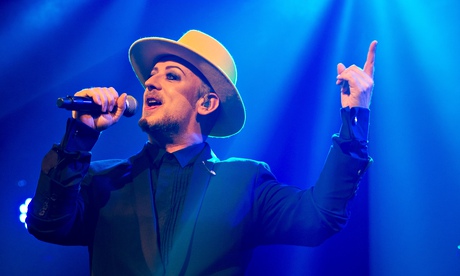
Wearing a large lemon-yellow hat, sporting a short beard and looking trim in a black suit, Boy George joins the rest of Culture Club on stage with a half-smile. This is the band’s first full gig in 12 years – a dry run for arena dates in December, heralding a new album in January; this subterranean gay club was reportedly the venue for Culture Club’s first-ever gig. Fans have come from as far afield as New York. At one point Boy George tries out his Italian on the front row. “You have a faraway look,” he tells another fan.
Most people present probably realise the distance the band themselves have travelled to get here. Tonight, drummer Jon Moss, bassist Mikey Craig, guitarist Roy Hay and singer George O’Dowd are functioning as a tight and vivid unit again, having put decades of animosity, affairs, drug addiction, Boy George’s successful DJ-ing career, legal troubles and a proposed 2006 Culture Club tour with another singer behind them. They have company too. Three backing vocalists huddle on the right of the small stage, a three-piece brass section is crushed into a row stage left, while an auxiliary guitarist paces at the back.
Thanks to the warmth of the brass and the punch of added vocals, the soul and reggae influences on this 1980s pop band are uppermost during a set that mixes old and new. Soulful opener Church of the Poison Mind actually sounds a lot older than its 30 years, while later on, Boy George gains a dub echo effect on his vocals, like a proper reggae MC.
The newest songs often tend towards easy-going retro too. Boy George announces one fresh cut, A Different Man, as a tribute to Sly Stone, while Like I Used To marks the miles with loose funkiness. “I don’t do emotion like I used to,” sings George. The consolatory brass implies that this is a good thing. Often, you are reminded less of the charts circa 1983, and more of Dexys Midnight Runners or the Specials – 80s bands whose own sensibilities harked markedly backwards. Hay poses hard on guitar, Craig takes a little bass solo, and Moss looks alarmingly unchanged from the days when he was O’Dowd’s secret lover. This isn’t just the Boy George show – Culture Club are very much a band.
In an industry packed with reunions, they are a band with continued relevance too, not least on singers such as Antony Hegarty of Antony and the Johnsons, and the break-out star of 2014, Sam Smith. Some onlookers even think Smith looks like the young Boy George as well as sounding like him. George also seems to share a milliner with Pharrell. The band, minus an injured Hay, opened the Commonwealth games last July and look set for a return to national treasure status. A few dissenting voices have pointed out in the past that Boy George’s conviction for falsely imprisoning an escort and subjecting him to abuse might be in danger of being forgotten rather too quickly.
Intermittently excellent tonight, Culture Club are not all they were, however. Like Boy George himself, O’Dowd’s voice has been through a great deal over the years, and its reedy sweetness has been replaced by a markedly huskier sound. You get the feeling Culture Club have chosen their older songs rather carefully.
Funky and subtly rearranged, Miss Me Blind is on offer, – “popular in the Americas,” quips George – but Victims – perhaps George O’Dowd’s greatest ever vocal tour de force – is not. War Song is not, perhaps, Culture Club’s greatest hit, but tonight it hits hard, with a gospel crescendo and a crowd-pleasing segue into Frankie Goes to Hollywood’s Two Tribes. The full-on band can sometimes drown Boy George out, as on a thumpy rendition of Karma Chameleon. “I can hear myself better here,” says George at the end, teetering on the lip of the stage.
When it comes, Do You Really Want to Hurt Me sounds even more like reggae than it used to when it was a huge hit in 1982, a very pleasant development. One of the night’s most affecting moments is hearing this most Caribbean and hetero-normative of genres imbued with such tenderness by a gay Anglo-Irishman. The kaleidoscopic crowd mirrors the people on stage: black, white, male, female, gay, straight, old and young; still as remarkable now as it was then.

